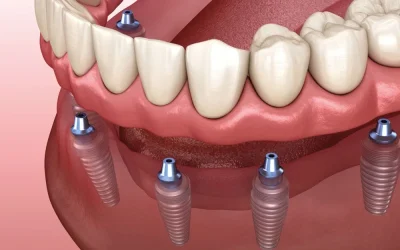Dental implants , a long-lasting and effective treatment method , are the secret to turning the perfect smile of your dreams into reality. However, the process also brings with it certain care recommendations and instructions. Especially after the implant, what you will eat and how you will eat are important issues for your oral and dental health. In today’s content, the professional dentists of Sevenhillsdent Clinic addressed exactly this issue and answered all your questions. Enjoy reading!
How Should Nutrition Be After Dental Implants?
After the procedure, it is necessary to choose soft, cold but nutritious foods that will not irritate the wounds in your mouth. The reason for this is that hard, extremely hot foods may damage the procedure area. Moreover, hard foods may cause pain and soreness during chewing. Paying attention to the nutritiousness of foods will also greatly shorten your full recovery process. For example, foods rich in vitamin C will help strengthen your connective tissue and accelerate the recovery process.
What to Eat on the First Day of Implant?
Immediately after implants, you should consume only cold liquids and avoid hot foods and drinks for the first 24 to 48 hours.
A nutritious, balanced diet is always important, but it’s especially important when recovering from dental implants. Vitamins and minerals play an important role in helping your body heal after surgery. However, it’s equally important that the foods you eat are gentle enough that they won’t irritate the implant site.
So, what can you eat?
- Vitamin-rich broths and soups that meet your body’s water needs while also providing nutritional value.
- Foods that contain many important vitamins, such as mashed zucchini, potatoes, bananas, applesauce, avocado or hummus.
- Scrambled eggs, salmon, and protein shakes can help speed up the protein recovery process.
- Dairy-free smoothies or banana ice cream that can help numb your mouth, reduce bloating, and keep your spirits up!
What should you avoid?
- Hot and spicy foods can cause irritation to the procedure area, slowing down your healing and even increasing your risk of infection.
- Hard fruits and vegetables. Raw carrots and apples, while nutritious, are difficult to chew, so you should avoid them. Instead, opt for softer alternatives like bananas and peas, which offer the same levels of nutrients without damaging your teeth.
- Popcorn and other crunchy snacks. Popcorn, nuts and seeds can get stuck in the processing area, causing discomfort and inflammation.
- Sticky or chewy sweets. You should especially avoid sweets that contain sugar. They tend to stick to teeth and can dislodge a temporary restoration.
Consuming Hot and Cold Foods After Implant
It is very likely that you will feel sensitivity in your mouth and in the procedure area in the first days after your implants are placed. Therefore, you should stay away from extremely hot and hard foods. Hard and hot foods can cause more irritation and cause pain/suffering.
Soft and cold foods are recommended for the period immediately after implants. Foods at room temperature or colder are the ideal choice.
Post-Implant Recovery Process
The healing process after an implant may vary depending on the patient’s general health and the location of the implant. However, in general, the healing process progresses as follows:
- First 24 Hours : Rest is essential. Patients should keep their heads elevated and apply ice packs to reduce swelling. It is common to experience some pain that can be managed with painkillers.
- First Week: Many patients can return to light activity, but intense exercise should be avoided for at least two weeks. A soft diet that includes foods such as yogurt, smoothies, and mashed potatoes is recommended. Avoid hard, crunchy, or spicy foods that could irritate the surgical site.
- Follow-up Visits: Regular follow-up appointments with the dentist are essential to monitor healing and implant stability. These visits usually occur at intervals of several months.
Smoking and Drinking Alcohol After Dental Implant
After dental implant surgery, both smoking and alcohol consumption can significantly hinder the healing process and overall success of the implants. Smoking is particularly harmful because it reduces blood circulation and oxygen levels in the body, which are crucial for the implant to integrate into the jawbone. This can lead to delayed healing, increased risk of infection, and an increased likelihood of implant failure.
It is generally recommended that patients abstain from smoking for at least two weeks before and after the procedure to promote optimal healing. Similarly, alcohol can negatively impact healing by weakening the immune system and causing dehydration, which inhibits tissue healing. Patients are advised to abstain from alcohol for at least 48 to 72 hours after surgery, and many dentists recommend a longer period of abstinence to ensure successful osseointegration and reduce the risk of complications.
In general, avoiding both smoking and alcohol is critical to achieving a healthy outcome after dental implant surgery.
Post Dental Implant Pain
It is common to experience pain or discomfort after dental implants, as the procedure involves surgery to insert titanium posts into the jawbone. Initially, patients may experience mild pain, especially in the first few days after surgery, as the anesthesia wears off and the body begins to heal. This discomfort can usually be managed with over-the-counter painkillers such as ibuprofen or acetaminophen, and applying a cold compress will help reduce swelling and ease pain.
It is important to stick to soft foods and follow dietary recommendations to avoid irritating the implant site. While some pain is normal, persistent or severe pain may indicate complications such as infection or implant failure and requires a visit to the dentist for evaluation. In general, with proper care and management, discomfort after dental implants usually subsides within a week, paving the way for the implants to heal successfully and integrate into the jawbone.
Oral Care After Dental Implants
For implant treatment to be successful, you need to take care of your oral hygiene. Most people tend to think that caring for implants is much more complicated and difficult than it is, but that is not the case at all. Caring for your implants is no different than caring for your natural teeth.
Regular brushing and using the right technique while brushing are important. You need to brush properly to remove the residues left on the tooth surfaces and between them. However, brushing should also be supported by the use of dental floss, because from time to time the bristles of your toothbrush are insufficient for the food residues stuck between the teeth.
In addition to these, you can get toothpaste and mouthwash recommendations from your dentist. A good toothpaste and mouthwash will directly affect the results of your dental care.
The final and most important step is regular dental checkups. Everyone should have their teeth checked regularly, whether they have implants or not. Scheduling regular appointments with your dentist is the single biggest step in maintaining optimal dental health.

What to Do After Dental Implants ?
- Avoid mouthwash for the first 24 hours
- Use gauze to control bleeding
- Apply cold compress
- Use your medications according to your doctor’s advice
- Consume soft and liquid foods on the first day.
- Avoid hot foods and drinks
- Do not smoke or consume alcohol for the first 24 hours
- Do not touch the implant area while brushing your teeth.
- Protect your stitches and avoid applying excessive force
- Lie down with your head up
- Avoid intense physical activity for the first few days
- Maintain regular oral hygiene during the healing process.
- Attend your doctor’s check-up appointments on time
- Use antiseptic mouthwash to maintain oral hygiene
- Avoid hard and sticky foods
- Get adequate rest
- Use an ice pack for pain and swelling
- Support recovery by drinking plenty of water
- Follow all instructions from your dentist carefully.
Implant Treatment at SevenHillsDent Clinic
A great smile can change your entire image in an instant. So what is the secret to achieving the smile of your dreams? Of course, working with professionals.
Dental surgery is very advanced today and there is an advanced solution for almost all dental problems. The main thing is the experience of the people who will perform this treatment. A dentist who has proven himself in his field will help you achieve the aesthetic results you want with maximum health.
SevenHillsDent Clinic offers reliable and quality service to its patients with its staff specialized in implant treatment and state-of-the-art devices. Implant treatments performed in our clinic are planned specifically for the needs of the patients and each stage is meticulously monitored. For long-lasting and successful results, it is of great importance that you follow our recommendations regarding nutrition and oral care after implantation. SevenHillsDent Clinic is always with you for a healthy and aesthetic smile!





